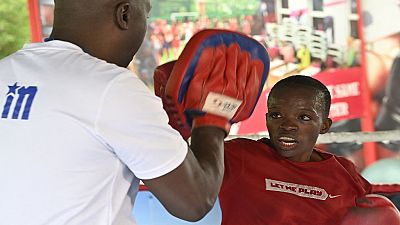Kenya
A mother at 12, raised in Nairobi's hardscrabble suburbs to survive by her fists, Christine Ongare dreams of becoming the first African woman to win an Olympic medal in boxing.
The 27-year-old Kenyan pugilist will have her chance in Tokyo -- her first Games, and a moment she still cannot believe is coming true.
"This one has always been my dream to participate in the Olympics games whereby to me, at least I have reached my goal, but my {main} goal is not yet complete."
"My goal in the Olympics is to stand in the podium because we have never had any woman representing Kenya, and Africa in the Olympics coming back with a medal" said Christine Ongare, who is in the female boxer - fly weight category.
Over the past 14 years, more than 3,000 women have practiced boxing in Kenya. While most of them do it as a hobby, some have made a living of it, becoming professional boxers. And some have even reached the Olympic Games, like Elizabeth Andiego in 2012 or Christine Ongare who will participate in a few days in the Tokyo Games.
"I remember when I was going to the Olympics in 2012, I gave her the flag henceforth, she held onto the flag and she said, “I will one day go to the Olympics and I’ll make our country proud and bring back the medal.” So I know she's capable, she's a hard worker, she goes for what she wants, and I know she'll make Kenya proud" Elizabeth Andiego, Kenyan female boxer said with confidence.
Adolescents or adults, they come from poor districts in the east of the Kenyan capital Nairobi. They are brought together by the BoxGirls Kenya association, allowing them access to this sport since 2007, often considered for men.
- "A dignified life" -
Anjere, nicknamed "Priest", created BoxGirls Kenya in 2007. A native of Kariobangi himself, he knew the problems of women in these neighborhoods; "Physical, mental and sexual violence, rape", "dropping out of school due to poverty, pregnancy, early marriage", "cultural and religious stereotypes", he lists.
The post-election violence of 2007 - the worst since the country's independence in 1963 with more than a thousand deaths - convinced him to take action: "I decided to use boxing, with the vision of a world where every girl, every woman can have a dignified life, be valued as an equal partner, with equal opportunities," he says.
For this advocate of a "holistic" vision of boxing, women can draw from this sport the weapons for their daily lives by developing "confidence and self-esteem", "resilience", "the importance of setting goals and striving to achieve them".
"Discipline, focus, leadership, self-awareness, sticking to your decisions," Sarah Achieng adds.
"It's a tough sport. But the longer you keep at it, the more you realize it's in your veins, the more you like it," Sophia Omari Amat emphasizes.
The primary objective of BoxGirls Kenya is not to train champions, but women "ready to face the outside world in all its aspects," explains Anjere. "The women are also vulnerable because they are not economically independent," he adds.
The association conducts workshops on entrepreneurship, rights awareness, sexuality and reproduction, and child protection in order to sensitize young women and men (225 of the 967 members in 2021 are boys) with one objective: "to challenge stereotypes" and "change mentalities".
While he often repeats that "sporting excellence is not an end in itself" in the association, Anjere will follow the performance of Christine Ongare, to whom he introduced boxing in 2008, at the Games.
"If girls like her succeed in boxing, it is a great pride. You can appreciate the work we do on the field," he confides. "The most important thing is that it was their choice: it's what they wanted to do in life and they were able to do it."













01:01
Kenya: Visa-free travel now available for many African and Caribbean countries
00:22
Boniface Kariuki, a Kenyan mask vendor shot at close range laid to rest
11:17
Bridging the legal gap in Africa’s digital boom {Business Africa}
Go to video
First Malaria treatment for babies approved
Go to video
AI videos falsely show Kenyan President resigning following deadly protests
02:16
Kenya's William Ruto faces growing discontent over economy and police brutality